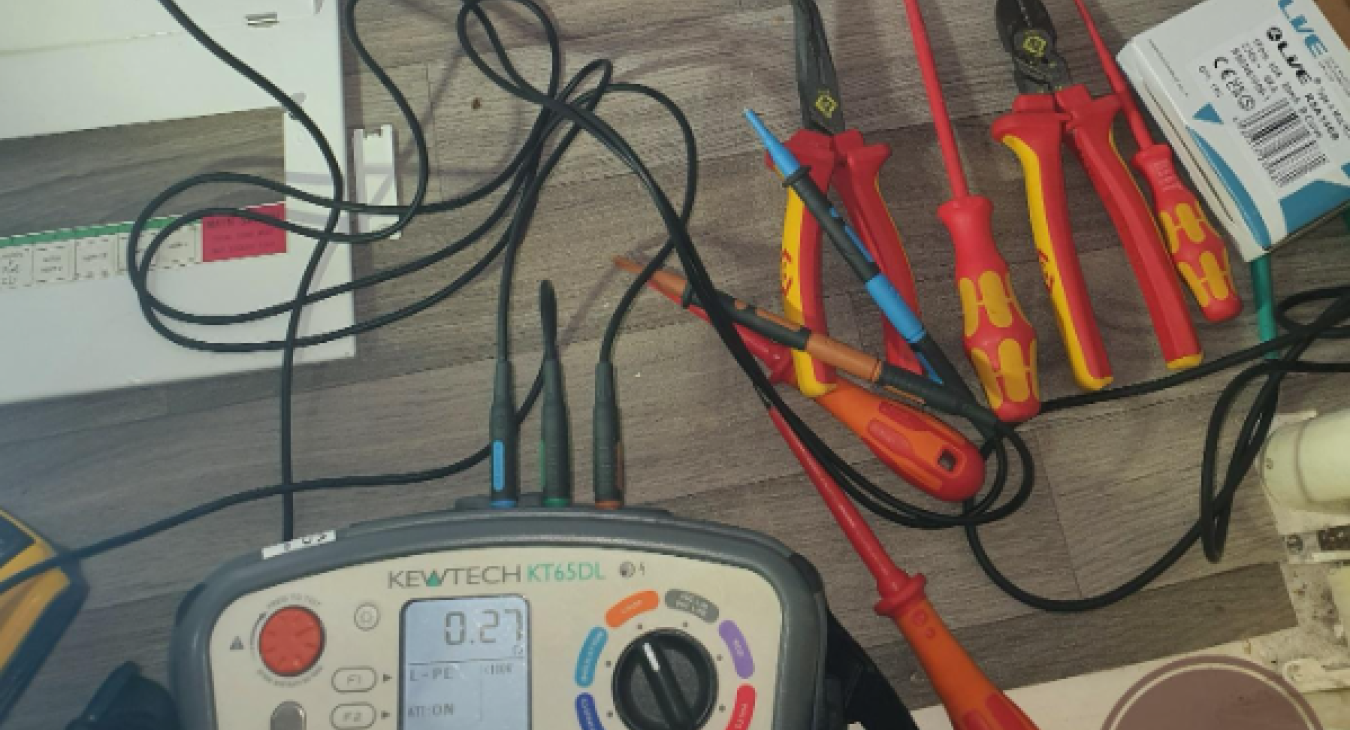How often should a house rewiring be done (2024) - Electrical Faults Fixed
The question on many of our minds when purchasing or living in an older property is the question of major maintenance. HOW OFTEN SHOULD YOU REWIRE A HOUSE? The answer is not as straightforward as you might expect but generally speaking, rewiring may be necessary every 25-30 years possibly longer. There are some exceptions to this and if you are considering purchasing a home, a wiring system that is older than this is not necessarily in need of rewiring.
Let me elaborate....
Table of Contents
- What are the factors that determine the need for rewiring?
- Signs that it's time to rewire a house
- Electrical Panel or Fuse Box Overheating
- Risks of an outdated electrical system
- Typical Lifespan of Electrical Wiring
- Typical lifespan of Electrical Panels and Consumer Units
- Rewire or Upgrade?
- Considerations when rewiring
- Resale and Home Insurance
- Conclusion
1) What are the factors that determine the need for rewiring?
There are a number of factors that will affect the required frequency of replacing a home’s wiring system.
The age of the home:- Older homes may have had the wiring and fuse box replaced a few times over but if not, the age of the home can determine when new wiring will need to be installed. The older the home, the older the wiring if it has not been replaced and old electrical wiring, can in some cases, become dangerous when it deteriorates.
Changes to the electrical code and wiring regulations:- Whist a full rewire is NOT necessary every time the wiring codes and regulations change, as technology moves on and modern appliances demand different things from our wiring systems, older electrical wires may not be up to the job of providing the necessary power for the demand anymore. The electrical panel may be unable to provide sufficient protection against fires and electric shocks and the need for additional circuits and replacement fuse board may mean that a rewire is preferable.
Increased Electrical Demands:- One of the most common electrical demands to be placed upon older systems in 2024 is the addition of an electrical vehicles charging station at our properties. Modern electrical wiring is normally up to the task of coping with this demand but older systems with often faulty electrics, can be put under tremendous strain when asked to supply such a heavy electrical load or lots of additional plug socket outlets. Outdated wiring systems were designed and installed when the reliance on electricity was far less than today’s modern demands.
Back to top2) Signs that it's time to rewire a house
There are a number of common signs that a home may need rewiring and whilst each of these on its own may not constitute the need for complete replacement of your home's electrical wiring, when several signs begin to appear it’s time to consult a professional electrician for help and advice.
2.1) Frequent Circuit Breaker trips and blown fuses
A circuit breaker is a type of Overcurrent Protective Device which prevents overloading the circuits and damaging cables. When these devices trip regularly or fuses blow, there is a good reason for this which usually means that electrical safety is at risk and that your home's wiring needs an electrician to carry out some fault finding. Constantly resetting a breaker or replacing fuses may be a fire risk and could cause long term damage to the electrical circuits.
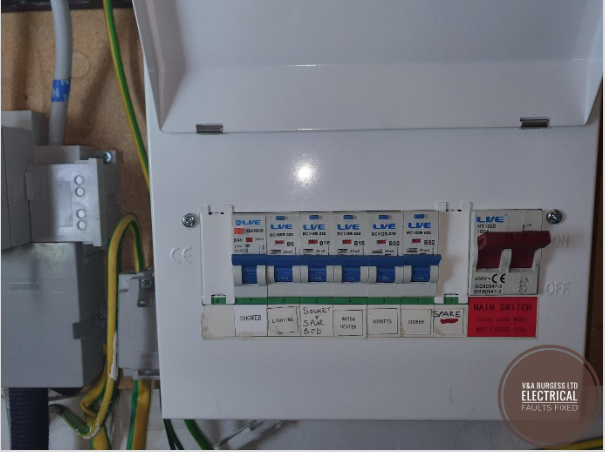
(Photo: RCBO Consumer Unit / Fuse Board)
2.2) Flickering or Dimming Lights
Whilst one light flickering may be a localised problem, such as faulty light fixtures, many lights that flicker can indicate that there are loose connections, damaged wires, faulty circuit breakers, junction box problems and risk of electrical fires. Flickering and dimming lights are not normal in a healthy electrical system and where this phenomenon occurs, investigation needs to take place to establish the cause.
2.3) Socket Outlets that feel warm or hot
The home's electrical system will often have an insufficient number of socket outlets especially in older homes. Under these circumstances it’s easy to overload the existing sockets which can be a cause of overheating. When home electrics are installed to modern standards, there are often several socket circuits installed into the consumer unit. This means that the overall plug socket demand is split, easing the demand on any one circuit. In older homes, it was common to have just ONE plug socket circuit for the whole property resulting in electrical issues when demand exceeded supply and causing faulty wiring much sooner as demand on cables increased.
When plug sockets are warm or hot, there can be a potential fire hazard and the cause for overheating electrical accessories should be checked out by a professional as soon as possible.
Back to top3) Electrical Panel or Fuse Box Overheating
The electrical panel (fuse box, fuse board, consumer unit) is the brains of any electrical system. Newer homes will have a much more modern consumer unit which will contain all the latest safety features and be up to date with the most recent wiring regulations. The consumer unit is responsible for electric shock prevention, overload prevention, protection against short circuits, a level of fire protection, surge protection and more.
If your fuse box or electrical panel is hot, then this is not normal operation for an electrical system and is certainly a sign of danger.
3.1) Frayed Wires and Damaged cables
Cables and wires can become damaged through a variety of means such as:
- Accidental damage
- Rodents chewing wiring
- Continuous overload
- Impact damage
Where cables are damaged, they should be inspected and replaced. The style of the cabling should be examined to make sure that it is suitable for its installed location and consideration should be given to cable routes and installation methods to ensure that cabling does not become damaged again. Where cables have become damaged as a result of excessive electrical load, then the circuit should be redesigned to cope with the load and reinstalled or loads removed and spread across other electrical circuits to prevent a recurrence of the issue.
3.2) Constant Electrical Faults and Repairs
A wiring system in good condition will not require frequent repairs. A new wiring system should not require inspection, repairs, or maintenance for ten years in a domestic home. Where electrical faults and repairs are needed regularly, it is a sign that existing wiring is struggling to cope and may be in poor condition.
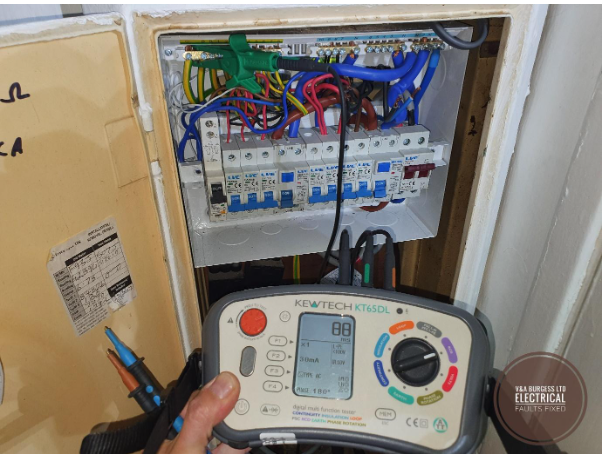
(Photo: Finding an Electrical Fault)
Back to top4) Risks of an outdated electrical system
There are a number of risks associated with an outdated electrical system.
4.1) Electrical Shock
Electrical shock is a serious matter and something that modern electrical wiring and systems will protect against. Older fuse boxes and cabling may not be able to provide sufficient protection from electrical shock. We have GFCI and RCD devices that will detect when somebody might be having a shock in newer electrical systems and modern electrical rewiring will also ensure that these devices are installed at the consumer unit or electrical panel when wiring is replaced. If you are receiving shocks from sinks, taps and pipework around the home then it can be incredibly dangerous.
4.2) Fire Safety Hazard
One of the major causes of electrical fires is loose connections and old circuit protection devices. Where there is a sign of loose wiring connections in one place there is almost a guarantee to be more loose connections throughout the rest of the electrical system. Typical signs of loose connections include flickering lights, crackling plug sockets, buzzing noises from electrical equipment and overheating.
4.3) Damage to appliances and equipment
Appliances can be damaged by a faulty electrical system. With the cost and number of electrical appliances that we have in our home, it is a good idea to have a periodic inspection carried out by an electrician to determine the condition of your home wiring. A thorough home wiring inspection will produce a report on its condition and allow you to understand the safety of your home wiring. Regular electrical inspections are vital to ensure that unnecessary damage does not occur to your home electrics.
4.4) Sudden Power Loss
Intermittent and sudden power loss problems are often as a result of loose connections, failing electrical panel or consumer unit components and left unchecked are likely to result in expensive repairs.
Back to top5) Typical Lifespan of Electrical Wiring
It is difficult to put an accurate figure on the lifespan of electrical wiring and components as so many factors can affect them.
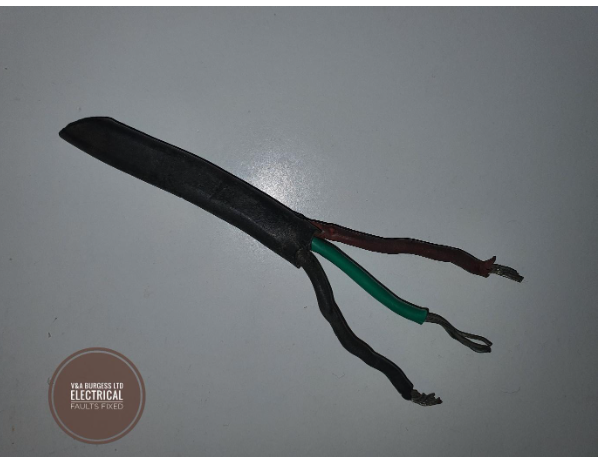
(Old Rubber Wiring circa 1930-1950)
Modern copper wiring is much safer and more reliable than aluminum wiring. A modern copper wiring installation is likely to last anywhere from 40-80 years but let’s look at WHAT affects this.
- Wear and Tear - A wiring system subject to a hectic family of 6 people where the kitchen is non-stop and cables are in continuous use is likely to wear out nearer the 40-year mark. Where a single occupant lives in the same property and seldom uses much more than a TV and table lamp the wiring will last far longer as there is less strain on the system.
- Original Quality of Installation - Better manufacturers will use premium materials for fabricating their cabling and electricians that install the wiring with care will mean that the system lasts longer than cheap cabling, thrown in quickly.
- Number of electrical faults - Where short circuit faults occur in cabling, the cable reaches very high temperatures very quickly whilst the fault is disposed of. This can have an effect on the insulation of the cable and cause it to prematurely fail. If your switches trip off, have it investigated as they are disposing of electrical faults which can be harming your wiring. More faults = more wear.
- Maintenance - Regular electrical inspections are an important part of wiring system maintenance. Electricians can pick up on degrading cables, dangerous situations and help prolong the life of a wiring system.
- Environmental factors - Wiring subject to heat, moisture and other external factors is likely to suffer adversely as a result. Where possible, ensure that any wiring is protected from the elements and any external factors such as rodents, mechanical damage and excessive hot or cold.
6) Typical lifespan of Electrical Panels and Consumer Units
The brains of any electrical system will need maintenance and replacement too. Most consumer units / electrical panels and components will last 25 - 35 years. The main panel is where the fault detection and control of the system happens. Circuit breakers, RCBOs and other devices will have a limited lifespan, the duration of which depends on:
- Frequency of trip switch activation - Trip switch devices dispose of large electrical fault currents when wiring problems occur. Each time they do this, it takes a toll on their working parts and internal components. The exact number of operations they can perform will vary depending upon original manufacturing quality, installation conditions and size of fault currents dissipated.
- Harsh conditions - It is not uncommon to find consumer units installed in a basement where possible damp or water, dust and debris can affect the metals that make up the moving parts of the panels and trip switches.
- Maintenance - Checks should be carried out by an electrician regularly to ensure that loose connections do not develop, parts are replaced when required and thermal damage is not occurring.
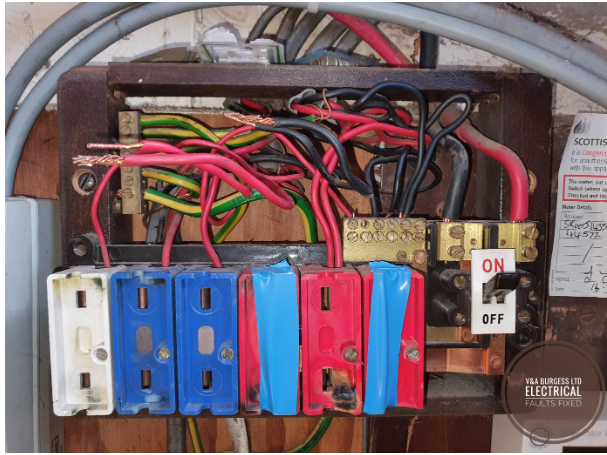
(Photo: An Old Fuse Box Circa 1960)
Back to top7) Rewire or Upgrade?
Rewiring a home is a disruptive task but not massively expensive when compared to other home renovation works that can are often carried out. It is likely that a home rewire will cost less than a new kitchen or bathroom in many cases and will benefit the overall property beyond that of cosmetic improvements.
In some cases, it is possible to simply replace the consumer unit or electrical panel and give the electrical system a new lease of life. This will do nothing for improving the quality of the cabling but will provide better protection, up to date compliance with safety wiring regulations and ensure that cables and occupants are safer than previously.
Back to top8) Considerations when rewiring
Modern homes require modern equipment and with the dawn of smart home systems and components it’s worth ensuring that your wiring is able to accommodate new technology. Your electrician is best placed to discuss this with you but as a minimum, make sure that:
- There is a neutral wire at each light switch.
- There are more socket outlets than you currently require.
- There is additional space in the consumer unit or panel for additional circuits.
- The mains supply is able to take heavy loads like EV charging equipment.
- The earthing is sufficient and up to date.
- Adequate data cabling is run throughout the property.
9) Resale and Home Insurance
By ensuring that home electrical system maintenance is carried out and rewiring done when required, it is likely that your home insurance company will be happier and premiums may be lower as a result. Insurance companies are less likely to pay out in the event of electrical system failure if the system is very old, has not been maintained or has been neglected throughout its life. One way of showing adequate maintenance is to have regular checks carried out by a qualified electrician along with repairs and rewiring when necessary.
Back to top10) Conclusion
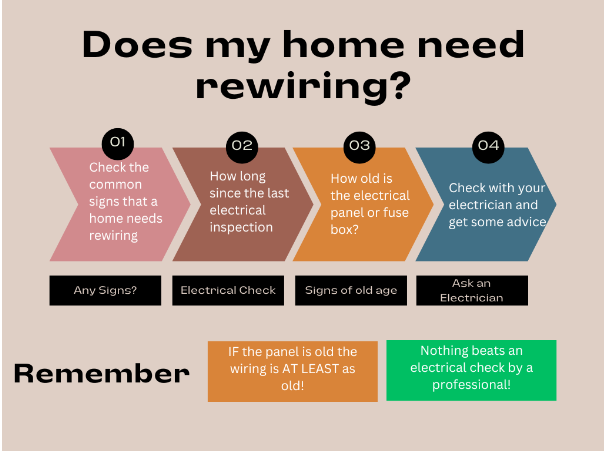
Simply because a wiring system is slightly older, does not mean that it will need rewiring immediately or in the near future. The only way to ascertain the condition of the electrical system is to have a thorough electrical inspection carried out by an electrician. Only then can we know what repairs, if any, will be needed along with the financial costs associated with those.
Read more articles
- Log in to post comments

